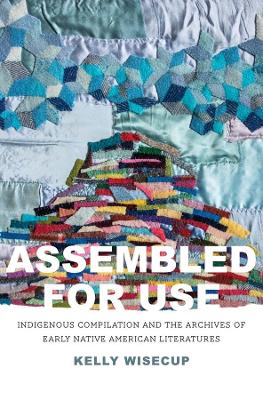The Henry Roe Cloud Series on American Indians and Modernity
1 total work
A wide-ranging, multidisciplinary look at Native American literature through non-narrative texts like lists, albums, recipes, and scrapbooks
"An intricate history of Native textual production, use, and circulation that reshapes how we think about relationships between Native materials and settler-colonial collections."-Rose Miron, D'Arcy McNickle Center for American Indian and Indigenous Studies at the Newberry Library
Kelly Wisecup offers a sweeping account of early Native American literatures by examining Indigenous compilations: intentionally assembled texts that Native people made by juxtaposing and recontextualizing textual excerpts into new relations and meanings. Experiments in reading and recirculation, Indigenous compilations include Mohegan minister Samson Occom's medicinal recipes, the Ojibwe woman Charlotte Johnston's poetry scrapbooks, and Abenaki leader Joseph Laurent's vocabulary lists. Indigenous compilations proliferated in a period of colonial archive making, and Native writers used compilations to remake the very forms that defined their bodies, belongings, and words as ethnographic evidence. This study enables new understandings of canonical Native writers like William Apess, prominent settler collectors like Thomas Jefferson and Henry Rowe Schoolcraft, and Native people who contributed to compilations but remain absent from literary histories. Long before current conversations about decolonizing archives and museums, Native writers made and circulated compilations to critique colonial archives and foster relations within Indigenous communities.
"An intricate history of Native textual production, use, and circulation that reshapes how we think about relationships between Native materials and settler-colonial collections."-Rose Miron, D'Arcy McNickle Center for American Indian and Indigenous Studies at the Newberry Library
Kelly Wisecup offers a sweeping account of early Native American literatures by examining Indigenous compilations: intentionally assembled texts that Native people made by juxtaposing and recontextualizing textual excerpts into new relations and meanings. Experiments in reading and recirculation, Indigenous compilations include Mohegan minister Samson Occom's medicinal recipes, the Ojibwe woman Charlotte Johnston's poetry scrapbooks, and Abenaki leader Joseph Laurent's vocabulary lists. Indigenous compilations proliferated in a period of colonial archive making, and Native writers used compilations to remake the very forms that defined their bodies, belongings, and words as ethnographic evidence. This study enables new understandings of canonical Native writers like William Apess, prominent settler collectors like Thomas Jefferson and Henry Rowe Schoolcraft, and Native people who contributed to compilations but remain absent from literary histories. Long before current conversations about decolonizing archives and museums, Native writers made and circulated compilations to critique colonial archives and foster relations within Indigenous communities.
